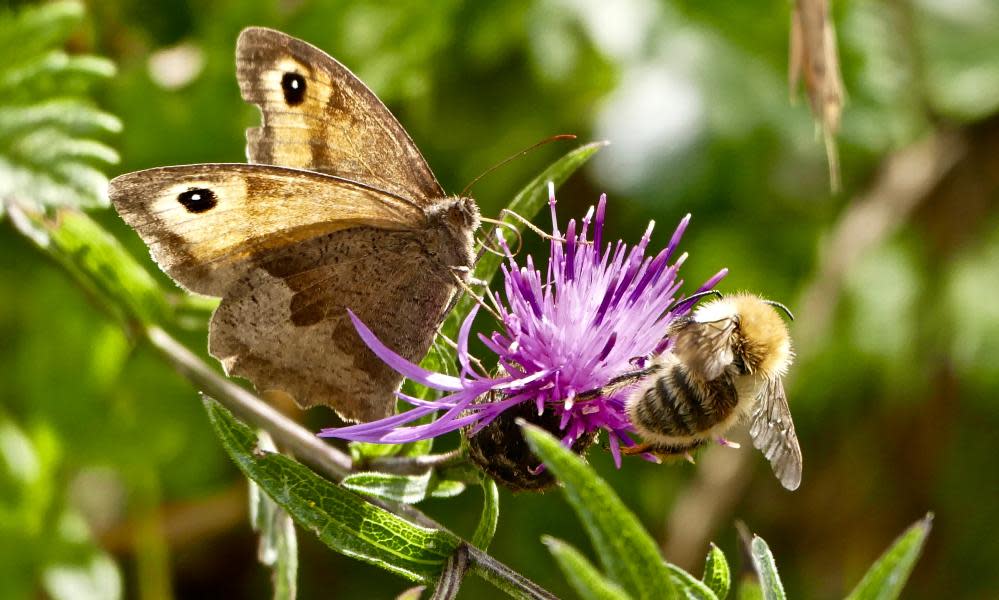The evidence points in one direction – we must ban neonicotinoids | Michael Gove

Two principles guide this government’s approach to the natural world. We want not just to protect but to enhance the environment. And we want our decisions to be informed at all times by rigorous scientific evidence.
Which is why when the science shows that our environment is in increasing danger we have to act. Like many others, I was deeply concerned by a recently published German study into the health of some insect populations. The Guardian covered the report in depth, not least because the statistics were so stark. Data gathered over 25 years appeared to indicate a 75% fall in the numbers of flying insects within those sites.
Environmental change on such a scale is profoundly worrying. Not least because of the critical role played by bees and other pollinators. These particular flying insects are absolutely critical to the health of the natural world. Without a healthy pollinator population we put the whole ecological balance of our world in danger.
Official biodiversity indicators show that the pollinator population has been in a state of overall decline since 1987. Although 29% of bee species increased over that period, 49% declined. Other evidence suggests more than half of solitary bees have declined.
And as is always the case, a deteriorating environment is ultimately bad economic news as well. Pollinators contribute somewhere between £400-680m every year to agricultural productivity, benefitting both the yield and the quality of crops. For example, gala apple growers are already spending £5.7m a year to do the work that natural pollinators should be doing, while for some crops like field beans there is evidence that a deficit in pollinator numbers is already having an adverse effect.
Where there is evidence that human activity is contributing to pollinator decline, we have a duty to act. Among the potential threats to pollinators are neonicotinoids, a type of pesticide. A recent report found that 75% of honey samples collected around the world contained neonicotinoids. However, the impact on bee health of the prevalence of neonicotinoids has been disputed.
In 2013, the European Commission proposed a ban on the use of three types of neonicotinoids on flowering crops. At that time, the UK’s assessment was that there was insufficient evidence of a link between neonicotinoids and pollinator decline, but other member states took a different view and a ban was implemented across the EU.
Since 2013, the evidence base has grown. The European Commission has now proposed the ban is extended to non-flowering crops. I asked the UK’s independent advisory body on pesticides to review the issue again. In their view, there is a growing body of evidence that indicates that the risks posed by neonicotinoids are greater than previously understood. They advise that the evidence now supports the restrictions introduced in 2013; indeed, there may also be a case for going further.
The most recent studies into neonicotinoids have taken the investigation out of a laboratory into the field to gather more meaningful results. These show a number of worrying indicators. First, when neonicotinoids are used on one crop, their residues can be found across the landscape. This contaminates pollinators’ food sources far and wide, not only on the crops where the pesticide was used. Second, wider investigation has shown that neonicotinoids can persist in soils for many years and have been detected in areas where there has been no known recent use. Neonicotinoids are also taken up by flowering weeds or subsequent flowering crops on those soils, causing further exposure to pollinators. Although the effects are subtle, the most recent studies point to a discernible effect on food sources and the productivity of bee colonies, which could have a worrying long-term impact on their populations.
While there is still uncertainty in the science, it is increasingly pointing in one direction. Not to act would be to risk continuing down a course which could have extensive and permanent effects on bee populations. That is not a risk I am prepared to take, so the UK will be supporting further restrictions on neonicotinoids. Unless the evidence base changes again, the government will keep these restrictions in place after we have left the EU.
The current process of emergency authorisations – used not just in the UK but across the EU – will remain in place, allowing the short-term, limited and controlled use of neonicotinoids in exceptional situations to control a threat that cannot be contained by any other reasonable means. Farmers will be able to apply to Defra who will take advice from the advisory body on pesticides and Defra’s chief scientist, with authorisations granted where the evidence is clear that neonicotinoid use is essential.
I understand the importance of pesticides for farmers. They have to protect their crops from dangerous threats throughout the growing season, and in that respect neonicotinoids have been useful. Farmers work hard round the clock to produce the high quality food and drink we all enjoy. Decisions which can, certainly in the short term, make their lives more difficult are not easy to take.
But ultimately we must ensure that we think about the long term health of our environment, because unless we take steps now to arrest environmental damage we will all be the losers. We only have one earth and it is our responsibility to hand it on to the next generation in a better state.
Michael Gove is the UK environment secretary
Will pollinator populations naturally recover if pesticide use falls?
What are the safe alternatives to neonicotinoid pesticides?
Why are pollinator populations so critical to the health of the natural world?

 Yahoo News
Yahoo News 
